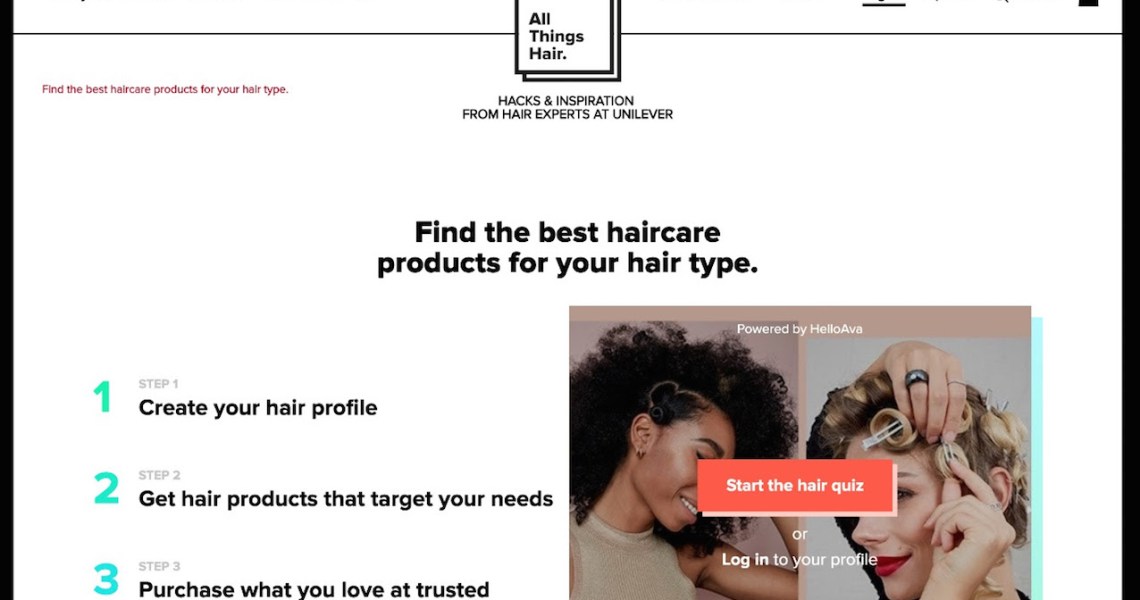CPG giant Unilever is getting into personalized beauty recommendations through a new partnership with startup HelloAva.
HelloAva, which launched in 2017, is an artificial intelligence–powered recommendation engine for skin-care products. Through its model, customers fill out a questionnaire on HelloAva.co and pay a $10 fee to receive beauty product recommendations. It has provided over 70,000 consultations since launch. The new Unilever partnership, which came through Unilever Foundry, the company’s global platform for partnering with startups to accelerate innovation, launched on May 28. It provides U.S. website visitors complimentary recommendations to Unilever hair products through its content website, AllThingsHair.com. All Things Hair launched in 2013 and is in eight markets, including the U.S., the U.K. and Russia. The U.S. website sees 170,000 unique visitors per month, driven in part by its hair tutorial YouTube channel, which has over 92,000 subscribers, and its past brand awareness partnerships.
“For us, personalization, in some form, is less of an agenda and more a consumer need,” said Rishabh Gandhi, head of digital transformation at Unilever Hair. “The reality is that the marketplace is evolving so dramatically, and with the fragmentation, people want more relevant solutions.”
That’s where HelloAva comes in: Its technology bridges the gap between 100% customization — offered by hair-care brand Function of Beauty, for example — and dozens of existing products under Unilever’s 12 hair brands, such as Dove, Tresemmé and Love Beauty and Planet. Visitors to All Things Hair are prompted with a pop-up window to fill out an 11-question quiz, which asks about hair texture, hair goals, styling preferences and how many steps they want in their hair-care routine. Quiz-takers can then view their recommendations and are directed to make a purchase online through one of Unilever’s retail partners, like Walmart.com or Target.com.
“We realized there is already a lot of product in the market, and users usually associate a customized product with premium pricing,” said Kailu Guan, co-founder and chief creative officer at HelloAva. “A lot of people don’t care if these products are customized, but whether the product works and if they can access it quickly and easily. Offering this solution on the market is more beneficial than just offering more product.”
Personalization quizzes have existed for some time, intended to do everything from help online customers discover their right foundation match to aid them in improving their shopping experiences. Their overall relevance and importance has increased, despite the saturation. According to a 2017 online survey from marketing firm Epsilon, the appeal for personalization is high, with 80% of respondents indicating they are more likely to do business with a company if it offers personalized experiences. All Things Hair has been somewhat of a test-bed for Unilever. For example, it’s where the company debuted a voice assistant through Amazon Alexa and Google Home in September 2018. Users can ask their smart speaker to “talk to All Things Hair” and can ask for hair advice, tips and trends.
The overall objective of the pilot is to develop insights and see if Unilever can generate the right personalized solutions within its portfolio. Key performance indicators are focused on consumer engagement, rather than conversion. For example, Unilever is looking at how well the tool is working, what the drop-off rate is and how users are engaging with the tool. From there, Unilever will put a plan together for scalability, Gandhi said. The partnership may also expand into body care, he said.
Ad position: web_incontent_pos1
“It’s about building our own capabilities and understanding AI, because Unilever is not a tech company. From those insights, we can go from there,” he said. “But the [long-term] hope is it will lead to more sales.”




